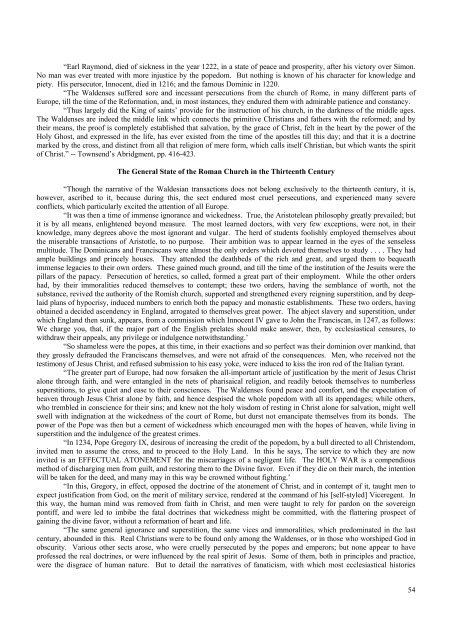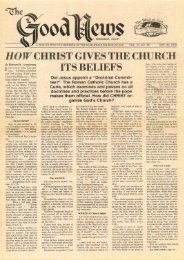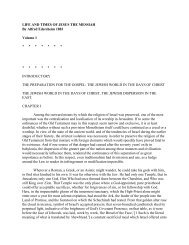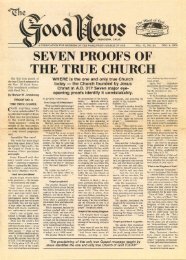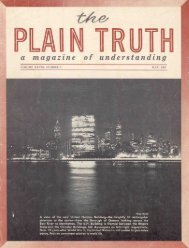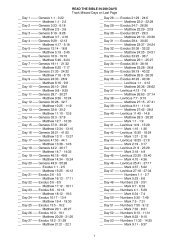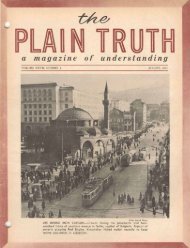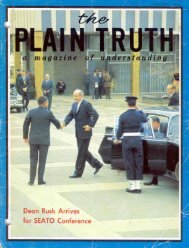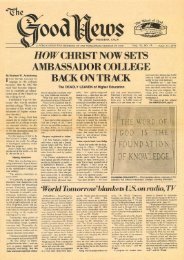History of the True Religion Traced from 33AD to Date - Lcgmn.com
History of the True Religion Traced from 33AD to Date - Lcgmn.com
History of the True Religion Traced from 33AD to Date - Lcgmn.com
Create successful ePaper yourself
Turn your PDF publications into a flip-book with our unique Google optimized e-Paper software.
“Earl Raymond, died <strong>of</strong> sickness in <strong>the</strong> year 1222, in a state <strong>of</strong> peace and prosperity, after his vic<strong>to</strong>ry over Simon.<br />
No man was ever treated with more injustice by <strong>the</strong> popedom. But nothing is known <strong>of</strong> his character for knowledge and<br />
piety. His persecu<strong>to</strong>r, Innocent, died in 1216; and <strong>the</strong> famous Dominic in 1220.<br />
“The Waldenses suffered sore and incessant persecutions <strong>from</strong> <strong>the</strong> church <strong>of</strong> Rome, in many different parts <strong>of</strong><br />
Europe, till <strong>the</strong> time <strong>of</strong> <strong>the</strong> Reformation, and, in most instances, <strong>the</strong>y endured <strong>the</strong>m with admirable patience and constancy.<br />
“Thus largely did <strong>the</strong> King <strong>of</strong> saints’ provide for <strong>the</strong> instruction <strong>of</strong> his church, in <strong>the</strong> darkness <strong>of</strong> <strong>the</strong> middle ages.<br />
The Waldenses are indeed <strong>the</strong> middle link which connects <strong>the</strong> primitive Christians and fa<strong>the</strong>rs with <strong>the</strong> reformed; and by<br />
<strong>the</strong>ir means, <strong>the</strong> pro<strong>of</strong> is <strong>com</strong>pletely established that salvation, by <strong>the</strong> grace <strong>of</strong> Christ, felt in <strong>the</strong> heart by <strong>the</strong> power <strong>of</strong> <strong>the</strong><br />
Holy Ghost, and expressed in <strong>the</strong> life, has ever existed <strong>from</strong> <strong>the</strong> time <strong>of</strong> <strong>the</strong> apostles till this day; and that it is a doctrine<br />
marked by <strong>the</strong> cross, and distinct <strong>from</strong> all that religion <strong>of</strong> mere form, which calls itself Christian, but which wants <strong>the</strong> spirit<br />
<strong>of</strong> Christ.” -- Townsend’s Abridgment, pp. 416-423.<br />
The General State <strong>of</strong> <strong>the</strong> Roman Church in <strong>the</strong> Thirteenth Century<br />
“Though <strong>the</strong> narrative <strong>of</strong> <strong>the</strong> Waldesian transactions does not belong exclusively <strong>to</strong> <strong>the</strong> thirteenth century, it is,<br />
however, ascribed <strong>to</strong> it, because during this, <strong>the</strong> sect endured most cruel persecutions, and experienced many severe<br />
conflicts, which particularly excited <strong>the</strong> attention <strong>of</strong> all Europe.<br />
“It was <strong>the</strong>n a time <strong>of</strong> immense ignorance and wickedness. <strong>True</strong>, <strong>the</strong> Aris<strong>to</strong>telean philosophy greatly prevailed; but<br />
it is by all means, enlightened beyond measure. The most learned doc<strong>to</strong>rs, with very few exceptions, were not, in <strong>the</strong>ir<br />
knowledge, many degrees above <strong>the</strong> most ignorant and vulgar. The herd <strong>of</strong> students foolishly employed <strong>the</strong>mselves about<br />
<strong>the</strong> miserable transactions <strong>of</strong> Aris<strong>to</strong>tle, <strong>to</strong> no purpose. Their ambition was <strong>to</strong> appear learned in <strong>the</strong> eyes <strong>of</strong> <strong>the</strong> senseless<br />
multitude. The Dominicans and Franciscans were almost <strong>the</strong> only orders which devoted <strong>the</strong>mselves <strong>to</strong> study . . . . They had<br />
ample buildings and princely houses. They attended <strong>the</strong> deathbeds <strong>of</strong> <strong>the</strong> rich and great, and urged <strong>the</strong>m <strong>to</strong> bequeath<br />
immense legacies <strong>to</strong> <strong>the</strong>ir own orders. These gained much ground, and till <strong>the</strong> time <strong>of</strong> <strong>the</strong> institution <strong>of</strong> <strong>the</strong> Jesuits were <strong>the</strong><br />
pillars <strong>of</strong> <strong>the</strong> papacy. Persecution <strong>of</strong> heretics, so called, formed a great part <strong>of</strong> <strong>the</strong>ir employment. While <strong>the</strong> o<strong>the</strong>r orders<br />
had, by <strong>the</strong>ir immoralities reduced <strong>the</strong>mselves <strong>to</strong> contempt; <strong>the</strong>se two orders, having <strong>the</strong> semblance <strong>of</strong> worth, not <strong>the</strong><br />
substance, revived <strong>the</strong> authority <strong>of</strong> <strong>the</strong> Romish church, supported and streng<strong>the</strong>ned every reigning superstition, and by deeplaid<br />
plans <strong>of</strong> hypocrisy, induced numbers <strong>to</strong> enrich both <strong>the</strong> papacy and monastic establishments. These two orders, having<br />
obtained a decided ascendency in England, arrogated <strong>to</strong> <strong>the</strong>mselves great power. The abject slavery and superstition, under<br />
which England <strong>the</strong>n sunk, appears, <strong>from</strong> a <strong>com</strong>mission which Innocent IV gave <strong>to</strong> John <strong>the</strong> Franciscan, in 1247, as follows:<br />
We charge you, that, if <strong>the</strong> major part <strong>of</strong> <strong>the</strong> English prelates should make answer, <strong>the</strong>n, by ecclesiastical censures, <strong>to</strong><br />
withdraw <strong>the</strong>ir appeals, any privilege or indulgence notwithstanding.’<br />
“So shameless were <strong>the</strong> popes, at this time, in <strong>the</strong>ir exactions and so perfect was <strong>the</strong>ir dominion over mankind, that<br />
<strong>the</strong>y grossly defrauded <strong>the</strong> Franciscans <strong>the</strong>mselves, and were not afraid <strong>of</strong> <strong>the</strong> consequences. Men, who received not <strong>the</strong><br />
testimony <strong>of</strong> Jesus Christ, and refused submission <strong>to</strong> his easy yoke, were induced <strong>to</strong> kiss <strong>the</strong> iron rod <strong>of</strong> <strong>the</strong> Italian tyrant.<br />
“The greater part <strong>of</strong> Europe, had now forsaken <strong>the</strong> all-important article <strong>of</strong> justification by <strong>the</strong> merit <strong>of</strong> Jesus Christ<br />
alone through faith, and were entangled in <strong>the</strong> nets <strong>of</strong> pharisaical religion, and readily be<strong>to</strong>ok <strong>the</strong>mselves <strong>to</strong> numberless<br />
superstitions, <strong>to</strong> give quiet and ease <strong>to</strong> <strong>the</strong>ir consciences. The Waldenses found peace and <strong>com</strong>fort, and <strong>the</strong> expectation <strong>of</strong><br />
heaven through Jesus Christ alone by faith, and hence despised <strong>the</strong> whole popedom with all its appendages; while o<strong>the</strong>rs,<br />
who trembled in conscience for <strong>the</strong>ir sins; and knew not <strong>the</strong> holy wisdom <strong>of</strong> resting in Christ alone for salvation, might well<br />
swell with indignation at <strong>the</strong> wickedness <strong>of</strong> <strong>the</strong> court <strong>of</strong> Rome, but durst not emancipate <strong>the</strong>mselves <strong>from</strong> its bonds. The<br />
power <strong>of</strong> <strong>the</strong> Pope was <strong>the</strong>n but a cement <strong>of</strong> wickedness which encouraged men with <strong>the</strong> hopes <strong>of</strong> heaven, while living in<br />
superstition and <strong>the</strong> indulgence <strong>of</strong> <strong>the</strong> greatest crimes.<br />
“In 1234, Pope Gregory IX, desirous <strong>of</strong> increasing <strong>the</strong> credit <strong>of</strong> <strong>the</strong> popedom, by a bull directed <strong>to</strong> all Christendom,<br />
invited men <strong>to</strong> assume <strong>the</strong> cross, and <strong>to</strong> proceed <strong>to</strong> <strong>the</strong> Holy Land. In this he says, The service <strong>to</strong> which <strong>the</strong>y are now<br />
invited is an EFFECTUAL ATONEMENT for <strong>the</strong> miscarriages <strong>of</strong> a negligent life. The HOLY WAR is a <strong>com</strong>pendious<br />
method <strong>of</strong> discharging men <strong>from</strong> guilt, and res<strong>to</strong>ring <strong>the</strong>m <strong>to</strong> <strong>the</strong> Divine favor. Even if <strong>the</strong>y die on <strong>the</strong>ir march, <strong>the</strong> intention<br />
will be taken for <strong>the</strong> deed, and many may in this way be crowned without fighting.’<br />
“In this, Gregory, in effect, opposed <strong>the</strong> doctrine <strong>of</strong> <strong>the</strong> a<strong>to</strong>nement <strong>of</strong> Christ, and in contempt <strong>of</strong> it, taught men <strong>to</strong><br />
expect justification <strong>from</strong> God, on <strong>the</strong> merit <strong>of</strong> military service, rendered at <strong>the</strong> <strong>com</strong>mand <strong>of</strong> his [self-styled] Viceregent. In<br />
this way, <strong>the</strong> human mind was removed <strong>from</strong> faith in Christ, and men were taught <strong>to</strong> rely for pardon on <strong>the</strong> sovereign<br />
pontiff, and were led <strong>to</strong> imbibe <strong>the</strong> fatal doctrines that wickedness might be <strong>com</strong>mitted, with <strong>the</strong> flattering prospect <strong>of</strong><br />
gaining <strong>the</strong> divine favor, without a reformation <strong>of</strong> heart and life.<br />
“The same general ignorance and superstition, <strong>the</strong> same vices and immoralities, which predominated in <strong>the</strong> last<br />
century, abounded in this. Real Christians were <strong>to</strong> be found only among <strong>the</strong> Waldenses, or in those who worshiped God in<br />
obscurity. Various o<strong>the</strong>r sects arose, who were cruelly persecuted by <strong>the</strong> popes and emperors; but none appear <strong>to</strong> have<br />
pr<strong>of</strong>essed <strong>the</strong> real doctrines, or were influenced by <strong>the</strong> real spirit <strong>of</strong> Jesus. Some <strong>of</strong> <strong>the</strong>m, both in principles and practice,<br />
were <strong>the</strong> disgrace <strong>of</strong> human nature. But <strong>to</strong> detail <strong>the</strong> narratives <strong>of</strong> fanaticism, with which most ecclesiastical his<strong>to</strong>ries<br />
54


